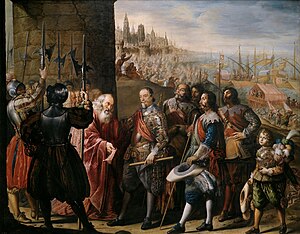| Relief of Genoa | |||||||
|---|---|---|---|---|---|---|---|
| Part of the Thirty Years' War | |||||||
 Relief of Genoa by the Marquis of Santa Cruz by Antonio de Pereda. Museo del Prado. | |||||||
| |||||||
| Belligerents | |||||||
|
|
| ||||||
| Commanders and leaders | |||||||
|
|
| ||||||
| Strength | |||||||
|
30,000 infantry[6] 3,000 cavalry[7] |
2,700–4,000 Spanish infantry (Genoa)[8] 23 galleys[8] 15,000 Spanish-Genoese (after the relief)[9] | ||||||
| Casualties and losses | |||||||
|
5,000 dead or wounded 2,000 captured | 1,300 dead | ||||||
The Relief of Genoa took place between 28 March 1625 and 24 April 1625, during the Thirty Years' War.[10] It was a major naval expedition launched by Spain against the French-occupied Republic of Genoa, of which the capital Genoa was being besieged by a joint Franco-Savoyard army composed of 30,000 men and 3,000 cavalry.[11]
In 1625, when the Republic of Genoa, traditionally an ally of Spain, was occupied by French troops of the Duke of Savoy, the city underwent a hard siege. It was known in Genoese governmental circles that one of the reasons why the Dutch government had offered their help to the Franco-Savoyan army was so that they could "hit the bank of the King of Spain".[12]
However, the Spanish fleet commanded by General Álvaro de Bazán, Marquis of Santa Cruz, came to the aid of Genoa and relieved the city. Returning its sovereignty to the Republic of Genoa and forcing the French to raise the siege, they consequently began a combined campaign against the Franco-Savoyan forces that had overrun the Genoese Republic one year before. The joint Franco-Piedmontese army was forced to leave Liguria and Spanish troops invaded Piedmont, thereby securing the Spanish Road.[2] Richelieu's Invasion of Genoa and the Valtelline had resulted in his humiliation by the Spaniards.[13]
I have been careful until now to avoid anything that could provoke an open war between the two crowns; [but] if the king of Spain takes up arms against me, I will be the last to lay them down.[14]
— Louis XIII to Francesco Barberini, early 1635
- ^ a b Wilson p.384
- ^ a b Paoletti p.26
- ^ Parker p.146
- ^ Thion p.18
- ^ Kirk p.100
- ^ Wilson p.383
- ^ Osborne p.94
- ^ a b Duro p.67
- ^ Osborne p.6
- ^ Braudel p.233
- ^ Hubert Granville Revell Reade – Sidelights on the Thirty Years War: Vol 2 p.xxxiv
- ^ Engels p.118
- ^ Stradling p.99
- ^ A. Lloyd Moote, Louis XIII, the Just, p.180
